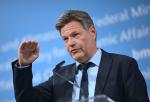Germany announced that its economy has entered a recession after GDP fell under the pressure of high inflation.
"We're fighting our way out of this crisis," Germany's Vice Chancellor and Minister for Economic Affairs Robert Habeck told reporters Thursday.
The GDP dropped by .3% in the first quarter of the year, following a decline of .5% in the final quarter of 2022, matching the common definition for a recession of successive quarters of contraction.
Household consumption dropped 1.2% for successive quarters after adjusting for price and seasonal factors, while government spending dropped a whopping 4.9% during the quarter. Experts lay blame on rampant inflation, which remains high in 2023 despite significant efforts throughout 2022.
FED OFFICIALS DIVIDED OVER ADDITIONAL INTEREST RATE HIKES, MEETING MINUTES SHOW
Inflation similarly pummeled U.S. households last year, according to a Federal Reserve survey published this week. The survey found that the share of U.S. adults who reported they were worse off financially than a year ago jumped from 20% to 35%, the highest level since the Fed started asking a decade ago.
Federal Minister of Finance Christian Lindner called the signs "surprisingly negative," and he added that the economy was losing the potential for growth, and he feared Germany might end up "in a league in which we have to relegate ourselves to the last position."
DEBT CEILING IS A ‘DISTRACTION,’ US WON'T DEFAULT: FINANCE EXPERT
A forecast from the International Monetary Fund predicted only Germany and Britain to suffer a recession in 2023 among European nations.
Germany did show an improvement in investment, particularly for machinery and equipment, which increased by 3.2% compared to the previous quarter, and investment in construction increased by 3.9%.
BRITISH ECONOMY EXPECTED TO AVOID RECESSION THIS YEAR, ACCORDING TO IMF FORECASTS
"The massive rise in energy prices took its toll in the winter half-year," Commerzbank chief economist Joerg Kraemer said.
GET FOX BUSINESS ON THE GO BY CLICKING HERE
The German Bundesbank expects the economy to grow modestly in the second quarter as industry could help a rebound effort to offset stagnant household spending, according to a report published Wednesday.
FOX Business’s Breck Dumas and Reuters contributed to this report.
